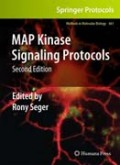
Mitogen-activated protein (MAP) kinase (MAPK) cascades are key signaling components that govern essentially all cellular processes evoked by any type of stimulation, and it has been well established that the malfunctioning of these cascades leads to various diseases including cancer, autoimmunity, and diabetes. In MAP Kinase Signaling Protocols, Second Edition, expert researchers fully update the popular first edition the key techniques used in the study of MAPK signaling cascades in various cellular contexts. This thorough volume exploresessential topics such as activation and function of components of the MAPK signaling cascades, the study of MAPK cascades as transmitters of membranal receptor signals, structure-function relationships of MAPKs, studies on the regulation of MAPK cascades, the use of lower organisms, animal models, and human genetics in the study of MAPKs, as well as the study of MAPKs in specific systems and diseases. Written in the highly successful Methods in Molecular Biology™series format, chapters includes introductions to their respective subjects, lists of the necessary materials, step-by-step, readily reproducible laboratory protocols, and tips on troubleshooting and avoiding known pitfalls. Comprehensive and cutting-edge, MAP Kinase Signaling Protocols, Second Edition aims tofacilitate the study of MAPKs and allow for quicker progress in our knowledgeof many vital cellular processes as well as devastating diseases. Presents easy-to-use, comprehensive, and fully updated techniques to study MAPKs Serves awide variety of scientists, from cellular biologists and biochemists to disease specialists seeking cures to diabetes, inflammation, and cancer Provides tips on troubleshooting difficult aspects of the included protocols INDICE: The MAP Kinase Signaling Cascades: A System of Hundreds of Components Regulates a Diverse Array of Physiological Functions.- Determination of ERK Activity: Anti-Phospho-ERK Antibodies and In vitro Phosphorylation.- Activation of SAPK/JNKs In vitro.- Activation of p38 and Determination of Its Activity.- Activity Assays for Extracellular Signal-Regulated Kinase 5.- Use of Inhibitors in the Study of MAP Kinases.- MAP Kinase Activation by Receptor TyrosineKinases: In Control of Cell Migration.- Activation of Ras and Rho GTPases andMAP Kinases by G Protein-Coupled Receptors.- Regulation of MAP Kinase Signaling by Calcium.- Identification of Novel Substrates of MAP Kinase Cascades Using Bioengineered Kinases that Uniquely Utilize Analogs of ATP to Phosphorylate Substrates.- ERK-MAP Kinase Signaling in the Cytoplasm.- Lentiviral Vectors toStudy the Differential Function of ERK1 and ERK2 MAP Kinases.- Structural Studies of MAP Kinase Cascade Components.- Analysis of MAP Kinases by Hydrogen Exchange Mass Spectrometry.- A ‘Molecular Evolution’ Approach for Isolation of Intrinsically Active (MEK-Independent) MAP Kinases.- Reconstitution of the Nuclear Transport of the MAP Kinase ERK2.- Localization and Trafficking of Fluorescently Tagged ERK1 and ERK2.- Studying the Regulation of MAP Kinase by MAP Kinase Phosphatases in vitro and in Cell Systems.- Proteomic Analysis of ScaffoldProteins in the ERK Cascade.- Analysis of ERKs’ Dimerization by Electrophoresis.- MAP Kinase - SUMO Pathway Interactions.- Computational Modelling of Kinase Signalling Cascades.- Analysis of MAP Kinase Activity in Yeast.- Detection of RTK Pathway Activation in Drosophila Using Anti-dpERK Immunofluorescence Staining.- Studying MAP Kinase Pathways During Early Development of Xenopus laevis.- Deciphering Signaling Pathways In vivo: The Ras/Raf/Mek/Erk Cascade.- Mutational and Functional Analysis in Human Ras/MAP Kinase Genetic Syndromes.- Implication of the ERK Pathway on the Post Transcriptional Regulation of VEGF mRNA Stability.- Studies on MAP Kinase Signaling in the Immune System.- Methods to Study MAP Kinase Signaling in the Central Nervous System.- MAP Kinase Regulation of the Mitotic Spindle Checkpoint.- Using High-Content Microscopy to Study Gonadotrophin-Releasing Hormone (GnRH) Regulation of ERK.
- ISBN: 978-1-60761-794-5
- Editorial: Humana
- Encuadernacion: Cartoné
- Páginas: 455
- Fecha Publicación: 29/08/2010
- Nº Volúmenes: 1
- Idioma: Inglés
